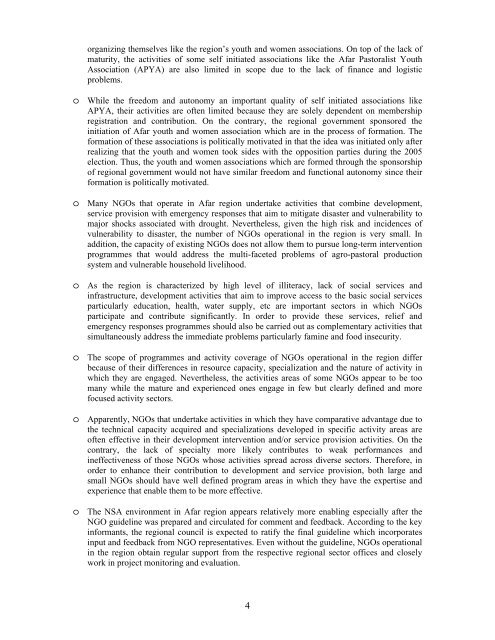Regional Reports - the European External Action Service
Regional Reports - the European External Action Service
Regional Reports - the European External Action Service
You also want an ePaper? Increase the reach of your titles
YUMPU automatically turns print PDFs into web optimized ePapers that Google loves.
organizing <strong>the</strong>mselves like <strong>the</strong> region’s youth and women associations. On top of <strong>the</strong> lack of<br />
maturity, <strong>the</strong> activities of some self initiated associations like <strong>the</strong> Afar Pastoralist Youth<br />
Association (APYA) are also limited in scope due to <strong>the</strong> lack of finance and logistic<br />
problems.<br />
o While <strong>the</strong> freedom and autonomy an important quality of self initiated associations like<br />
APYA, <strong>the</strong>ir activities are often limited because <strong>the</strong>y are solely dependent on membership<br />
registration and contribution. On <strong>the</strong> contrary, <strong>the</strong> regional government sponsored <strong>the</strong><br />
initiation of Afar youth and women association which are in <strong>the</strong> process of formation. The<br />
formation of <strong>the</strong>se associations is politically motivated in that <strong>the</strong> idea was initiated only after<br />
realizing that <strong>the</strong> youth and women took sides with <strong>the</strong> opposition parties during <strong>the</strong> 2005<br />
election. Thus, <strong>the</strong> youth and women associations which are formed through <strong>the</strong> sponsorship<br />
of regional government would not have similar freedom and functional autonomy since <strong>the</strong>ir<br />
formation is politically motivated.<br />
o Many NGOs that operate in Afar region undertake activities that combine development,<br />
service provision with emergency responses that aim to mitigate disaster and vulnerability to<br />
major shocks associated with drought. Never<strong>the</strong>less, given <strong>the</strong> high risk and incidences of<br />
vulnerability to disaster, <strong>the</strong> number of NGOs operational in <strong>the</strong> region is very small. In<br />
addition, <strong>the</strong> capacity of existing NGOs does not allow <strong>the</strong>m to pursue long-term intervention<br />
programmes that would address <strong>the</strong> multi-faceted problems of agro-pastoral production<br />
system and vulnerable household livelihood.<br />
o As <strong>the</strong> region is characterized by high level of illiteracy, lack of social services and<br />
infrastructure, development activities that aim to improve access to <strong>the</strong> basic social services<br />
particularly education, health, water supply, etc are important sectors in which NGOs<br />
participate and contribute significantly. In order to provide <strong>the</strong>se services, relief and<br />
emergency responses programmes should also be carried out as complementary activities that<br />
simultaneously address <strong>the</strong> immediate problems particularly famine and food insecurity.<br />
o The scope of programmes and activity coverage of NGOs operational in <strong>the</strong> region differ<br />
because of <strong>the</strong>ir differences in resource capacity, specialization and <strong>the</strong> nature of activity in<br />
which <strong>the</strong>y are engaged. Never<strong>the</strong>less, <strong>the</strong> activities areas of some NGOs appear to be too<br />
many while <strong>the</strong> mature and experienced ones engage in few but clearly defined and more<br />
focused activity sectors.<br />
o Apparently, NGOs that undertake activities in which <strong>the</strong>y have comparative advantage due to<br />
<strong>the</strong> technical capacity acquired and specializations developed in specific activity areas are<br />
often effective in <strong>the</strong>ir development intervention and/or service provision activities. On <strong>the</strong><br />
contrary, <strong>the</strong> lack of specialty more likely contributes to weak performances and<br />
ineffectiveness of those NGOs whose activities spread across diverse sectors. Therefore, in<br />
order to enhance <strong>the</strong>ir contribution to development and service provision, both large and<br />
small NGOs should have well defined program areas in which <strong>the</strong>y have <strong>the</strong> expertise and<br />
experience that enable <strong>the</strong>m to be more effective.<br />
o The NSA environment in Afar region appears relatively more enabling especially after <strong>the</strong><br />
NGO guideline was prepared and circulated for comment and feedback. According to <strong>the</strong> key<br />
informants, <strong>the</strong> regional council is expected to ratify <strong>the</strong> final guideline which incorporates<br />
input and feedback from NGO representatives. Even without <strong>the</strong> guideline, NGOs operational<br />
in <strong>the</strong> region obtain regular support from <strong>the</strong> respective regional sector offices and closely<br />
work in project monitoring and evaluation.<br />
4

















